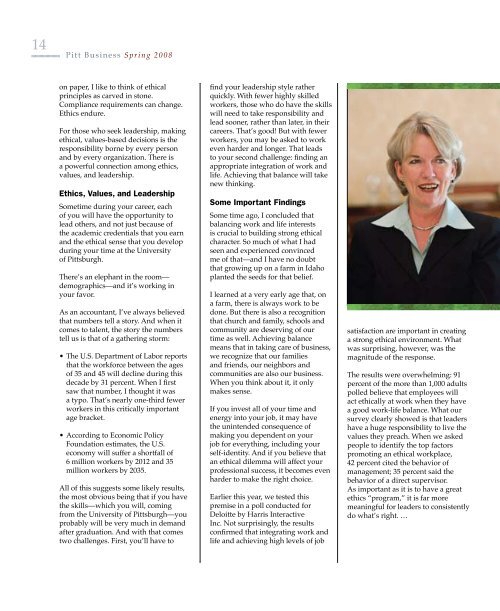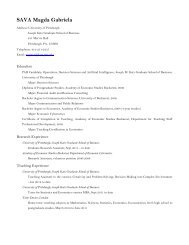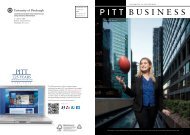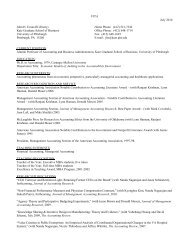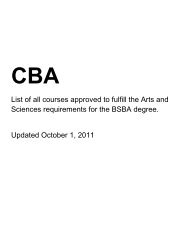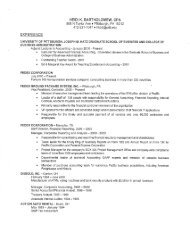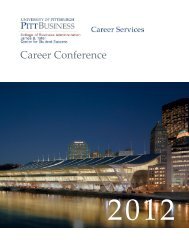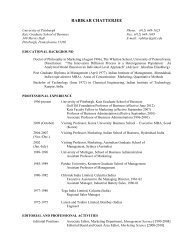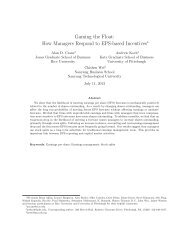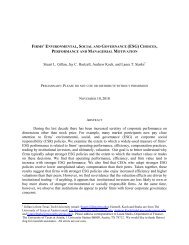Entrepreneurship - Pitt Business - University of Pittsburgh
Entrepreneurship - Pitt Business - University of Pittsburgh
Entrepreneurship - Pitt Business - University of Pittsburgh
You also want an ePaper? Increase the reach of your titles
YUMPU automatically turns print PDFs into web optimized ePapers that Google loves.
14<br />
<strong>Pitt</strong> <strong>Business</strong> Spring 2008<br />
on paper, I like to think <strong>of</strong> ethical<br />
principles as carved in stone.<br />
Compliance requirements can change.<br />
Ethics endure.<br />
For those who seek leadership, making<br />
ethical, values-based decisions is the<br />
responsibility borne by every person<br />
and by every organization. There is<br />
a powerful connection among ethics,<br />
values, and leadership.<br />
Ethics, Values, and Leadership<br />
Sometime during your career, each<br />
<strong>of</strong> you will have the opportunity to<br />
lead others, and not just because <strong>of</strong><br />
the academic credentials that you earn<br />
and the ethical sense that you develop<br />
during your time at the <strong>University</strong><br />
<strong>of</strong> <strong>Pitt</strong>sburgh.<br />
There’s an elephant in the room—<br />
demographics—and it’s working in<br />
your favor.<br />
As an accountant, I’ve always believed<br />
that numbers tell a story. And when it<br />
comes to talent, the story the numbers<br />
tell us is that <strong>of</strong> a gathering storm:<br />
• The U.S. Department <strong>of</strong> Labor reports<br />
that the workforce between the ages<br />
<strong>of</strong> 35 and 45 will decline during this<br />
decade by 31 percent. When I first<br />
saw that number, I thought it was<br />
a typo. That’s nearly one-third fewer<br />
workers in this critically important<br />
age bracket.<br />
• According to Economic Policy<br />
Foundation estimates, the U.S.<br />
economy will suffer a shortfall <strong>of</strong><br />
6 million workers by 2012 and 35<br />
million workers by 2035.<br />
All <strong>of</strong> this suggests some likely results,<br />
the most obvious being that if you have<br />
the skills—which you will, coming<br />
from the <strong>University</strong> <strong>of</strong> <strong>Pitt</strong>sburgh—you<br />
probably will be very much in demand<br />
after graduation. And with that comes<br />
two challenges. First, you’ll have to<br />
find your leadership style rather<br />
quickly. With fewer highly skilled<br />
workers, those who do have the skills<br />
will need to take responsibility and<br />
lead sooner, rather than later, in their<br />
careers. That’s good! But with fewer<br />
workers, you may be asked to work<br />
even harder and longer. That leads<br />
to your second challenge: finding an<br />
appropriate integration <strong>of</strong> work and<br />
life. Achieving that balance will take<br />
new thinking.<br />
Some Important Findings<br />
Some time ago, I concluded that<br />
balancing work and life interests<br />
is crucial to building strong ethical<br />
character. So much <strong>of</strong> what I had<br />
seen and experienced convinced<br />
me <strong>of</strong> that—and I have no doubt<br />
that growing up on a farm in Idaho<br />
planted the seeds for that belief.<br />
I learned at a very early age that, on<br />
a farm, there is always work to be<br />
done. But there is also a recognition<br />
that church and family, schools and<br />
community are deserving <strong>of</strong> our<br />
time as well. Achieving balance<br />
means that in taking care <strong>of</strong> business,<br />
we recognize that our families<br />
and friends, our neighbors and<br />
communities are also our business.<br />
When you think about it, it only<br />
makes sense.<br />
If you invest all <strong>of</strong> your time and<br />
energy into your job, it may have<br />
the unintended consequence <strong>of</strong><br />
making you dependent on your<br />
job for everything, including your<br />
self-identity. And if you believe that<br />
an ethical dilemma will affect your<br />
pr<strong>of</strong>essional success, it becomes even<br />
harder to make the right choice.<br />
Earlier this year, we tested this<br />
premise in a poll conducted for<br />
Deloitte by Harris Interactive<br />
Inc. Not surprisingly, the results<br />
confirmed that integrating work and<br />
life and achieving high levels <strong>of</strong> job<br />
satisfaction are important in creating<br />
a strong ethical environment. What<br />
was surprising, however, was the<br />
magnitude <strong>of</strong> the response.<br />
The results were overwhelming: 91<br />
percent <strong>of</strong> the more than 1,000 adults<br />
polled believe that employees will<br />
act ethically at work when they have<br />
a good work-life balance. What our<br />
survey clearly showed is that leaders<br />
have a huge responsibility to live the<br />
values they preach. When we asked<br />
people to identify the top factors<br />
promoting an ethical workplace,<br />
42 percent cited the behavior <strong>of</strong><br />
management; 35 percent said the<br />
behavior <strong>of</strong> a direct supervisor.<br />
As important as it is to have a great<br />
ethics “program,” it is far more<br />
meaningful for leaders to consistently<br />
do what’s right. …


